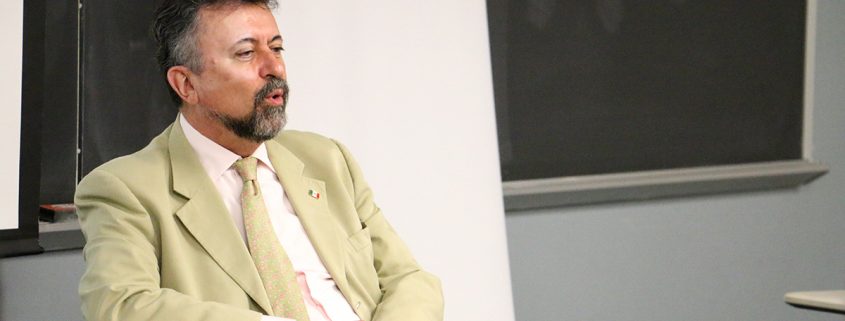Mexican Consul tackles election impact
Consul General of Mexico Carlos García de Alba spoke about his role in diplomacy and the impact of a Trump presidency on U.S.-Mexico relations with a group of students and faculty Wednesday evening.
The event was organized by AEM Jóvenes Los Angeles, an international organization that helps Mexican businesspeople and professionals achieve success in the United States. Consul of Cultural Affairs Andrés Webster and Vice President for Strategic and Global Initiatives Anthony Bailey were also present.
García became the Consul General of Los Angeles in June. He started his career 30 years ago and has since worked in Canada, Italy, Indonesia, El Salvador, Dallas, France and Ireland. Throughout his career abroad, he has continued to travel back to Mexico on a regular basis.
In response to a question about how the consulate’s strategy has changed due to the result of the presidential election, García said that Mexico was ready to work with Trump but would wait to make any guarantees until he made several important decisions, such as appointing a cabinet.
“We still don’t know if he has the intention of moving forward with the wall, deporting people working here and more,” García said. “In the meantime, the consulate is working as hard as possible on a daily basis. If he really starts deporting people, you can imagine the kind of emergency we will face in the coming months.”
García added that Trump’s outspoken claims that he would deport all 11 million undocumented immigrants working in the U.S. would hurt the economies of both countries if they were acted upon.
“If President Trump decides to deport them, I don’t see the Americans doing [the Mexicans’] jobs,” García said. “My only wish is that both countries keep working hard, [because] there is a huge connection between them. I hope that everything will keep moving smoothly.”
García brought up the importance of diplomacy in the modern era, and the efforts that Mexico is making to reach out to other nations. According to García, Mexico has 73 embassies around the world.
“It’s still not enough,” García said. “According to the United Nations, there are now 208 nations around the world.”
García said the consulate has two main jobs: protection and documentation. The consulate serves to protect Mexicans living abroad, as well as providing them with identification, passport replacements, notary services and more.
He added that promotion has become a major part of his job. One way the consulate is encouraging promotion at USC is through “La Carte de la México,” which President C. L. Max Nikias is set to sign later this week. This document proposes that the consulate brings a prestigious Mexican, particularly some kind of artist, to speak about Mexico every year. The consulate offers internships to students who are interested.
García also addressed the Mexican diaspora, the second largest diaspora in the world. He said that out of the 125 million residents of Mexico, roughly 10 percent permanently live abroad. Furthermore, 97 percent of those people live in the United States, making the relationship between the two countries that much more important.
“There is not a single state in the U.S. with fewer than 10,000 Mexicans,” García said.
García also spoke about the ways that immigration from Mexico has changed over time. From 1850 to 1950, just over 4,000 Mexicans were moving to the United States each year. In 1980, 2.5 million crossed the border to the United States. However, García said that Mexican immigration to the United States has slowed down dramatically in the last five years. He added that the profile of Mexican immigrants has changed greatly in the last 20 to 25 years.
“Historically speaking, Mexicans coming to the United States were from four states in central and western Mexico,” García said. “After 1980, almost everybody started moving to the United States. Almost every single state in Mexico had this transfer of migrants.”
Today, 47 percent of immigrants from Mexico are women, meaning that more families are migrating together. Approximately 1 million Mexican immigrants in the United States are professionals and executives. However, García brought up that many undocumented immigrants who come to the United States from Mexico face issues working and earning a living.
“When you are a worker in the U.S. with no papers and you are not getting paid enough, you can ask your boss to be paid,” García said. “Many [people without papers] are scared to ask because they could get deported. Even when you don’t have papers, you have rights, [and] many people don’t know that.”

